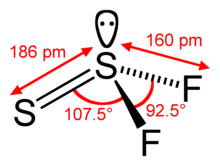Chemistry:Thiothionyl fluoride

| |
| Names | |
|---|---|
| IUPAC name
difluoro(sulfanylidene)-λ4-sulfane
| |
| Other names
Sulphur(IV) sulfide difluoride
| |
| Identifiers | |
3D model (JSmol)
|
|
| ChemSpider | |
PubChem CID
|
|
| |
| |
| Properties | |
| S=SF 2 | |
| Molar mass | 102.12 g·mol−1 |
| Appearance | colorless gas |
| Melting point | −164.6 °C (−264.3 °F; 108.5 K) |
| Boiling point | −10.6 °C (12.9 °F; 262.5 K) |
Except where otherwise noted, data are given for materials in their standard state (at 25 °C [77 °F], 100 kPa). | |
| Infobox references | |
Thiothionyl fluoride is a chemical compound of fluorine and sulfur, with the chemical formula S=SF
2. It is an isomer of disulfur difluoride (difluorodisulfane) F–S–S–F.
Preparation
Thiothionyl fluoride can be obtained from the reaction between disulfur dichloride with potassium fluoride at about 150 °C or with mercury(II) fluoride at 20 °C.[1][2][clarification needed]
- S
2Cl
2 + 2 KF → S=SF
2 + 2 KCl
Another possible preparation is by the reaction of nitrogen trifluoride with sulfur.[1]
- NF
3 + 3 S → S=SF
2 + NSF
It also forms from disulfur difluoride when in contact with alkali metal fluorides.[3]
S=SF
2 can also be synthesized with the reaction of potassium fluorosulfite and disulfur dichloride:
Properties
Thiothionyl fluoride is a colorless gas.[2] At high temperatures and pressures, it decomposes into sulfur tetrafluoride and sulfur.[2]
- 2 S=SF
2 → SF
4 + 3 S
With hydrogen fluoride, it forms sulfur tetrafluoride and hydrogen sulfide.[5]
- S=SF
2 + 2 HF → SF
4 + H
2S
It condenses with sulfur difluoride at low temperatures to yield 1,3-difluoro-trisulfane-1,1-difluoride.
- S=SF
2 + SF
2 → FS–S–SF
3[6]
References
- ↑ 1.0 1.1 Brauer, Georg; Baudler, Marianne (1975). Handbuch der Präparativen Anorganischen Chemie. Band I. (3rd ed.). Stuttgart: Ferdinand Enke. pp. 182. ISBN 3-432-02328-6.
- ↑ 2.0 2.1 2.2 Holleman, A. F.; Wiberg, E.; Wiberg, N. (1995). Lehrbuch der Anorganischen Chemie. (101st ed.). Berlin: Walter de Gruyter. pp. 379. ISBN 3-11-012641-9.
- ↑ Steudel, Ralf (2008). Chemie der Nichtmetalle: Von Struktur und Bindung zur Anwendung. Walter de Gruyter. pp. 475. ISBN 978-311021128-3.
- ↑ 张青莲 (1991) (in Chinese). Beijing: Science Press. p. 179. ISBN 978-7-03-002238-7.
- ↑ Kolditz, Lothar (1983). Anorganische Chemie. Berlin: Deutscher Verlag der Wissenchaften. pp. 468.
- ↑ Lösking, O.; Willner, H.; Baumgärtel, H.; Jochims, H. W.; Rühl, E. (November 1985). "Chalkogenfluoride in niedrigen Oxydationsstufen. X Thermochemische Daten und Photoionisations-Massenspektren von SSF2, FSSF, SF3SF und SF3SSF". Zeitschrift für anorganische und allgemeine Chemie 530 (11): 169–177. doi:10.1002/zaac.19855301120.
 |

